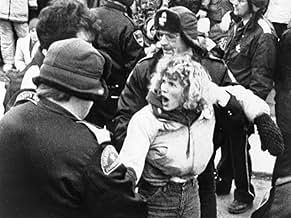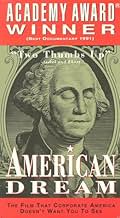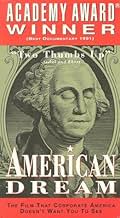AVALIAÇÃO DA IMDb
7,8/10
1,1 mil
SUA AVALIAÇÃO
Adicionar um enredo no seu idiomaRecounts the 1985-86 strike against the Hormel Foods Corporation in Minnesota after its employees' wages and benefits were cut.Recounts the 1985-86 strike against the Hormel Foods Corporation in Minnesota after its employees' wages and benefits were cut.Recounts the 1985-86 strike against the Hormel Foods Corporation in Minnesota after its employees' wages and benefits were cut.
- Ganhou 1 Oscar
- 12 vitórias e 3 indicações no total
Dan Rather
- Self
- (cenas de arquivo)
Ronald Reagan
- Self
- (cenas de arquivo)
Avaliações em destaque
10jgtoms
This film is absolutely stunning. It centers around union meatpacking workers at a Hormel plant in Austin, Minnesota in the mid-80's. The trouble started when Hormel cut worker pay from $10.69 an hour to $8.25 an hour. The problem? Hormel had just posted a net profit of $30 million. As one worker at a union meeting put it, "If we have to take a cut of $2.45 an hour when the company just made $30 million, I hate to think of what's gonna happen when they actually post a loss." With no help from their parent union, International Food and Commercial Workers Union, the local union (P-9) goes on strike alone trying to bring Hormel to its knees. Director Barbara Kopple, who also made the great "Harlan County, USA", does an outstanding job of capturing every important moment. She has the camera there at every union meeting, press release, Hormel press release, etc. She also shows the very personal aspects of a strike going into people's homes and showing their innermost feelings about what's going on. In the end, the strike is long, drawn out, and things appear bleak. The constant Minnesota cold, snow and ice are always in the background as well. If one doesn't have a greater appreciation for unions and what they have to sometimes endure after watching this film, he/she probably didn't pay very good attention.
Barbara Kopple's American Dream is a painful but honest on all sides look at what labor unions have to go through when they go into strike- mode, and how corporations, starting in the 80's, say the unions flaws in negotiating as a means to get in to change things for their benefit. It's that kind of movie though that doesn't discriminate in a key way - I think if you're pro-union or anti-union even, you can get something out of this take by how Kopple presents everything. The characters here all want what's best, but it's not so simple as'let's negotiate a contract'. Sides become fractured, tempers get flared, and a 'labor consultant' arguably muddies the waters early on in the negotiating. By the time it gets to be many weeks into the strike, some of the folks on the picket lines get desperate, cross and go back to work, and the sides become even more fractured.
It's about the Hormel meat-packing district, but the staying power of the film is this: it could be anywhere. Is it just about if wages decrease by two dollars, or four dollars, or about something more when it comes to bargaining, the rights of workers, and who is really in control? The interviews and perspective are in large part on Lewie Anderson, who probably has the most common sense as we can see it (or rather in comparison with the Consultant Ray Rogers, who is technically a corporate guy as well), and how he has to approach the union and the chief committee about where to go with Hormel - and of course the flaws are there, like rewriting the contract that has forty years of bargaining in it for the rights of the workers.
This is not to say that, for the warts-and-all approach Kopple takes, that she is on the side of the corporate masters at Hormel. We see one of their spokesman, who is a down-the-line party guy, talk to the camera(s) with the candor that one expects from such a corporate man about dealing with the union leaders (maybe not as villainous as, say, a Roger Smith from Roger & Me, but what is). But it's mostly there, in those halls and on the picket lines and in those smokey, emotional offices that Kopple takes her sights and tells this story. How it becomes a tale for almost everyone (not to say that, probably, those who have worked in unions or know people who have, that makes up a good lot of Americans, will connect deeper with it) is that it's not about complex legal wrangling. It's about what people do when pushed up against a wall, and put themselves into a war.
It is a complicated tale to tell, that is without easy answers, but by the end you can't say you don't see how things did not turn out well, especially with the greater picture (albeit not shown really or at least on the level of the 'smaller-but-bigger' picture the director paints) that the country was in at the time, and still are. What happens to these Americans, all hard workers, when faced against corporate pressures, and then other workers are brought in across the picket lines. What happens to society?
It's about the Hormel meat-packing district, but the staying power of the film is this: it could be anywhere. Is it just about if wages decrease by two dollars, or four dollars, or about something more when it comes to bargaining, the rights of workers, and who is really in control? The interviews and perspective are in large part on Lewie Anderson, who probably has the most common sense as we can see it (or rather in comparison with the Consultant Ray Rogers, who is technically a corporate guy as well), and how he has to approach the union and the chief committee about where to go with Hormel - and of course the flaws are there, like rewriting the contract that has forty years of bargaining in it for the rights of the workers.
This is not to say that, for the warts-and-all approach Kopple takes, that she is on the side of the corporate masters at Hormel. We see one of their spokesman, who is a down-the-line party guy, talk to the camera(s) with the candor that one expects from such a corporate man about dealing with the union leaders (maybe not as villainous as, say, a Roger Smith from Roger & Me, but what is). But it's mostly there, in those halls and on the picket lines and in those smokey, emotional offices that Kopple takes her sights and tells this story. How it becomes a tale for almost everyone (not to say that, probably, those who have worked in unions or know people who have, that makes up a good lot of Americans, will connect deeper with it) is that it's not about complex legal wrangling. It's about what people do when pushed up against a wall, and put themselves into a war.
It is a complicated tale to tell, that is without easy answers, but by the end you can't say you don't see how things did not turn out well, especially with the greater picture (albeit not shown really or at least on the level of the 'smaller-but-bigger' picture the director paints) that the country was in at the time, and still are. What happens to these Americans, all hard workers, when faced against corporate pressures, and then other workers are brought in across the picket lines. What happens to society?
It may at times resemble an illustrated Bruce Springsteen protest ballad, but the tragedy in Barbara Kopple's Oscar winning documentary portrait of a Minnesota meat packer's strike is too rich to ignore, not unlike the film 'Roger & Me' but without Michael Moore's self-serving humor. The story begins in the mid 1980s, when the Hormel Company in Austin, Minnesota, tried to lower wages despite showing a healthy profit, leading members of Local P-9 to ignore their parent Union and hire an rhetoric spouting outside agitator (labor 'consultant' Ray Rogers), who transformed their grievance into a noble but ultimately self-defeating grassroots crusade. Kopple herself remains more or less invisible throughout the film, but her sympathy for the renegade P-9 underdogs (and her anti-Reaganomics attitude) is obvious, and she reveals the personal and civic consequences of labor disunion with heartbreaking clarity. The strike itself may not have made headlines outside the Mid West, but the story has some devastating implications for organized labor nationwide, and beyond that supplies enough drama and character to match any Hollywood blockbuster.
"American Dream" is a sobering and fascinating documentary depicting the social, economic and emotional ramifications of a labor strike initiated by employees at a Hormel meatpacking plant in Austin, Minnesota. Although the film depicts events that take place in 1986, the content is every bit as relevant today on the subject of the perennial gap that exists between rank-and-file workers and top executives at major U.S. corporations, and the general greed and mercenary attitude that drives said corporations at the expense of hard-working employees. Like "Roger & Me," the acclaimed documentary by Michael Moore that savaged General Motors and the 80's corporate ethos of "profits above everything else," "American Dream" is a priceless portrait of blue-collar work and life in small-town America, the kind of place that people who live in New York, Washington D.C., Los Angeles or any other major metro area will probably never see.
Austin is a town where one company is the largest employer (in this case, the Hormel meat company), on whom generations of workers depend for their livelihood. The film puts a human face on the repercussions that result when Hormel, despite record profits, cuts the salaries of its workers. If the balding, grey-suited, humorless Hormel executives depicted here (wearing huge eyeglasses in the style of Lee Iaccoca) are not the epitome of 80's greed, I don't know what is. They are Gordon Gekko come to life, caring only about their bottom line and how to maximize profit, completely indifferent to the plight of their workers. The Enron debacle shows that, for all their economic might and wealth creation, there is a dark side to corporate America. "American Dream," its ironic title aside, is a journey to that dark side that should be seen by every worker, blue-collar or white-collar. Try to catch it on the Sundance or Independent Film Channel.
Austin is a town where one company is the largest employer (in this case, the Hormel meat company), on whom generations of workers depend for their livelihood. The film puts a human face on the repercussions that result when Hormel, despite record profits, cuts the salaries of its workers. If the balding, grey-suited, humorless Hormel executives depicted here (wearing huge eyeglasses in the style of Lee Iaccoca) are not the epitome of 80's greed, I don't know what is. They are Gordon Gekko come to life, caring only about their bottom line and how to maximize profit, completely indifferent to the plight of their workers. The Enron debacle shows that, for all their economic might and wealth creation, there is a dark side to corporate America. "American Dream," its ironic title aside, is a journey to that dark side that should be seen by every worker, blue-collar or white-collar. Try to catch it on the Sundance or Independent Film Channel.
the most obvious parallel is michael moore's "roger & me." both films look at one community dealing with a corporation's decision to either cut the work force (roger and me) or drastically cut its wages (american dream). michael moore interjects himself into his films a great deal - he is in front of the camera, he uses voice-overs - instead of intertitles - to fill in needed information, etc. some think this is to his detriment, but i think it is honesty...he clearly acknowledges that there is an author and that's a good thing. american dream, on the other hand, attempts to appear objective by choosing to use intertitles and keeping the filmmakers behind the camera. the storytelling and pacing of this film isn't as good as that of "roger and me," but when it comes to documentaries there is room for error in these areas. documentaries ultimately, at least for me, are judged primarily on the story they tell, more than how well they tell it; and i think that's less true for feature films. this film tells a good story. through the film we are able to see the entire process a union undertakes when they have a dispute. if you don't know much about unions then this is a great place to start. if you hate corporations then this will fuel your fire. if you like good documentaries then add this to your list. B.
Você sabia?
Principais escolhas
Faça login para avaliar e ver a lista de recomendações personalizadas
- How long is American Dream?Fornecido pela Alexa
Detalhes
- Data de lançamento
- Países de origem
- Central de atendimento oficial
- Idioma
- Também conhecido como
- Американская мечта
- Locações de filme
- Empresas de produção
- Consulte mais créditos da empresa na IMDbPro
Bilheteria
- Faturamento bruto nos EUA e Canadá
- US$ 269.823
- Fim de semana de estreia nos EUA e Canadá
- US$ 9.291
- 22 de mar. de 1992
- Faturamento bruto mundial
- US$ 269.823
Contribua para esta página
Sugerir uma alteração ou adicionar conteúdo ausente

Principal brecha
By what name was American Dream (1990) officially released in India in English?
Responda




















